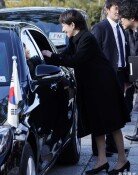[Opinion] Cyber War
In May 1999, U.S. President Bill Clinton approved a top secret plan targeting Yugoslavia President Slobodan Milosevic. The plan included hacking Milosevics foreign bank accounts to disable their transactions. Such an incident heralded the era of the Cyber War. Since then, many nations in the world have been competitively developing their cyber war capabilities. Some 10 countries, including the United States and Russia, are known to be equipped with a fairly high level of cyber war capabilities.
Computers and the Internet have surfaced as essential weapons of psychological operations in which language, a non-violent means, is employed. If you look at the Yugoslav War, you can find that psychological warfare has already become inseparable from cyber war which employs the Internet and email. There is also no distinction between soldiers and civilians in cyber war. When a U.S. patrol flight clashed with a Chinese combat fighter in 2001, the two countries conducted a war without gunfire. Although there were no hostilities between the two countries, netizens fought each other on the Internet.
Ignited by Japans absurd claim over the sovereignty of Dok-do islets, and malicious distortion of Korean images on Japanese websites, tension between Korean and Japanese netizens is escalating. Netizens of the two countries have even mobilized a means of cyber war. For instance, some netizens are trying to paralyze their counterpart countrys particular websites by using hacking tools. Some Korean netizens are intensifying their criticism over Japanese culture, saying, An eye for an eye, and a tooth for a tooth.
In an attempt to receive support from extreme right-wingers in Japan, Japanese Prime Minister Junichiro Koizumi appears to have carefully calculated his political interests over his surprise New Year visit to the controversial Yasukuni Shrine in Tokyo, commemorating the country`s war dead, and his absurd sovereignty claim of Dok-do islets. In this regard, it is natural for the people of Korea to show their anger and firm resolution. However, expressing malevolent criticism or conducting cyber terror attacks can not be a proper measure. Extreme rightists must be a minority in Japan. There must be a greater number of Japanese who accept the truth as it is and want to establish amicable relationship with Koreans. I believe informing the correct history and truth to Japanese is one of the best tactics of winning in psychological warfare.
Editorial Writer Cheon Gwang-am, iam@donga.com




![[속보]서울 버스, 오늘 첫차부터 정상운행…노사, 임금 2.9% 인상 합의](https://dimg.donga.com/c/138/175/90/1/wps/NEWS/IMAGE/2026/01/15/133159932.1.jpg)


